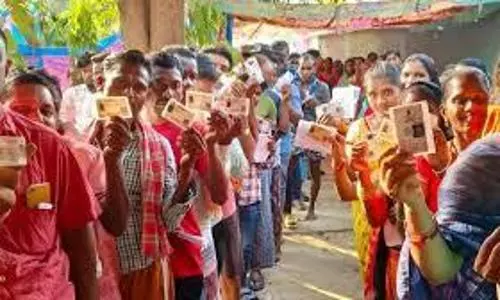
Democratic etiquette taking a beating
text_fieldsIt would not a dream of even a fool that the campaign for the 17th Lok Sabha election will become debates seeking answers to India's contemporary social issues. Any one with the slightest political literacy will know that more than the note-ban and agrarian crisis, it will be communalism and hatred of the other religion that will take centre-stage during the campaign period. But when the run-up reached the last phase of the campaign, the despicable and impolite language used by those in power has got so vilified as to belie the expectation of even a democracy-sceptic.
Politicians are wondering to one another what would that be called democratic etiquette. The current comedy is a picture in which those who refuse to abide by even the primary decorum of democracy, ask for votes to strictly implement the values of the constitution. Words have been devalued. Lies have become the biggest capital of power. The art of public speaking has degenerated to mean uttering big lies without inhibition before large mobs. Top leaders are those who revel in using abusive words against opponents. The campaign catchword of 'techno-democracy' is that the one using the worst verbiage will get maximum hits.
Even the Supreme Court has become powerless to end hate speeches and election code violations. It was disappointing that the latest Supreme Court verdict dismissed the petitions about the partiality shown by the Chief Election Commissioner on the complaints raised against the ruling party's campaign leaders, prime minister Narendra Modi and Ami Shah. And that becomes an inentive for more unethical campaigns. The petition filed by Congress leader Sushmita Dev was rejected on the grounds that it had become obsolete. And the court's judgement was that it could not consider the merits of otherwise of the clean chit given to Modi and Shah based on that petition. The Supreme Court declined to examine whether it was right or wong on the part of the Election Commission to sit on the complaints for weeks. The bench did not look at all at the fact that action was taken against other leaders on similar complaints, and that CEC Sunil Arora had suppressed the dissent note by a member of the Election Commission, Ashok Lavasa. If even the highest court of the land cannot notice the ridicule of the military, of various religious and regional sections and offormer leaders of the country, and inciting violent hatred in mean language, it would be foolish to assume that the culture and idiom of democracy are still alive.
But then, who will benefit from the decay of democratic system? Who will gain from the loss of people's confidence by throwing to the winds the norms of democracy? In the answers to these questions lie the crucial social crisis faced by India. The period of this election's campaign, unlike previous times, has provoked and disappointed several communities. Unfortunately, all of those provocations were triggered by the prime minister or his party. Never before in Indian history did we have an occasion for prominent individuals in various disciplines come out against the false claims by him and his colleagues. Former military chiefs were forced to make a protest against dragging in the military for political interests. People of Mumbai entered the fray against insulting Hemant Karkere. The scientific community mobilized a signature campaign and published it through the media against the excessive zeal of the government to promote fake science. And most recently, the teachers of Delhi now speak before the public with proofs against the derogatory remarks made about Rajiv Gandhi. In one way, the wind of political polarization lashing Bengal and Odisha post-Fani are even more hazardous than 'Fani' which led to a huge natural disaster. The starting point of this, once again, was the prime minister.
Solemn statements about democracy without honouring electoral ethics are hollow. When the poll campaign comes to its last phase, it is a terrifying sight to see how void the core of Indian democracy is. Election Commission, different investigation agencies, Income Tax Department, Reserve Bank of India, and finally even the courts are generating a gloom of fear. Indian people who have imbibed democratic pluralism as their culture, especially the rural population, have in the past proven their ability to recapture the mores of democracy through right voting. The future of democracy hinges on whether even they have lost their ability to think in the face of shrill vituperation of power-seekers, and the fanfare of media barons.























